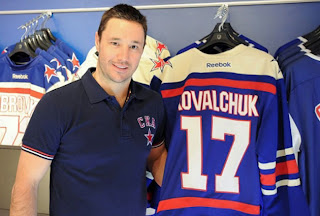The next day, it was revealed that the NHL rejected the contract because it circumvented the league's salary cap. An arbitrator heard the union's appeal but still rejected the deal.
Another deal was submitted to the NHL on September 4th, 2010 which the league approved. The contract that was approved is the one he opted out of this past week worth $100 million over 15 years.
The NHL penalized the New Jersey Devils for their attempt at circumventing the salary cap with Kovalchuk's original 17 year deal. The punishment included a $3 million dollar fine, a third round draft choice in the 2011 NHL Draft, and one future first round draft choice within the next four seasons.
In the seasons after his gargantuan contract, Kovalchuk responded with 31 and 37 goal seasons in 2010-2011 and 2011-2012 respectively. During the lockout he played with SKA St. Petersburg in the KHL where he put up 42 points in 36 games.
His high level of play carried back into the NHL where he was a little shy of being a point per game player (as his career average is) by producing 31 points in 37 games played.
So we've established he has more money than most people will ever see in their lives, is a bonafide sniper in the best hockey league in the world and is an alternate captain for a team that just went to the Stanley Cup finals.
That is why his (seemingly) sudden announcement to retire from the NHL shocked the league.
Today we look at why he made the decision to retire and what repercussions his departure will have on the rest of the NHL.
Since his decision to leave the NHL became public, more information has also been released about his desire to leave. Devils general manager, Lou Lamoriello, knew that Kovalchuk had been considering a return back to Russia since before the 2012-2013 shortened season.
Why did he want to leave in the first place?
Being a Russian hockey player in North America has it's pros and cons like anything else. For starters, Kovalchuk's family is still in Russia which must be hard on anyone being that far away from home, especially if the family ties are strong.
Second, capgeek says that his cap hit for the Devils was $6.66 million annually but in this past shortened season he was being paid $11 million and was due for a raise in the upcoming season.
In North America, taxes put a good dent into what he could be making. Even though that kind of money is more than enough for anyone to live luxuriously, there are alternative options that could see him get paid more for his hockey skills.
Enter the KHL.
When Kovalchuk announced his retirement from the NHL, no one believed that was the end of his hockey career for a second.
By returning home to Russia, Kovalchuk puts himself in a situation where he can not only be closer to his friends and family, but can also play hockey in front of them and make even more money.
It was announced yesterday that Kovalchuk signed a four year contract with SKA St. Petersburg (the team he skated for during the lockout) that is believed to pay him anywhere from $15-$20 million dollars per year...untaxed.
That would make him the highest paid hockey player in the entire world. Think about that for a second.
The reaction to his departure has varied from speechless to comical to angry. Jeremy Roenick voiced his opinion over twitter. You could say he was one of the angry reactions.
There have also been valid points made that in regards to the Devils organization (which has been rumored to be in financial trouble for quite some time now) this move could help them out.
The story doesn't end there: Kovalchuk's sister reportedly said that her brother would return to the NHL. Should he try to make that comeback within the next year, he would need unanimous approval from all 30 NHL clubs. If he tried to come back the following season, he would require approval from the Devils.
Things get interesting in 2018. When Kovalchuk is 35, the rules change and he wouldn't have to get approval from anyone. He would be an unrestricted free agent because his contract with the Devils would be up, and he would come off the voluntary retired list, effectively allowing him to sign with any team in the NHL should he desire to come back.
What does his departure mean for the immediate future?
As previously mentioned, it gives the Devils some much needed cap relief. It's not all good news for the Devils as they will be forfeiting their 1st round pick in the 2014 Draft because of their punishment for circumventing the cap. This could be problematic for the organization as, without Kovalchuk and Clarkson, their team does not look prepared to succeed in a highly competitive and improving Eastern Conference.
Other than that, mark your calenders for 2017-2018. For the next few years, this story will fall to the back-burner, but you can be rest assured that this is not the last you have heard from Ilya Kovalchuk.

No comments:
Post a Comment